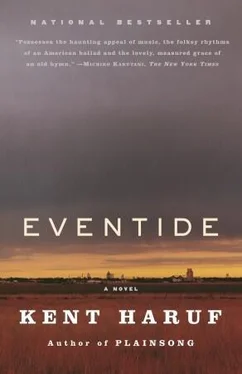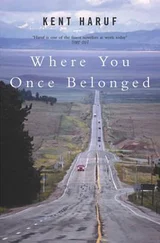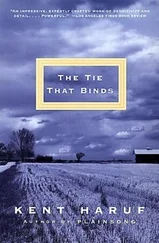No.
But usually we only make these kind of long-distance calls to relatives.
Just call her on the phone, Raymond said. Can’t you do that?
If she were a relative, a niece, or something like a daughter.
She is like a daughter to me. More than like a daughter. She’s what I’ve got to think of right now.
Well. The nurse looked at him. He was watching her intently, his face washed clean now, the scratches on his cheeks and forehead showing vivid and inflamed. All right, she said. But it’s not the usual procedure. How do you spell it?
Raymond turned away. Good Christ, he said.
Very well, she said. I’ll figure it out. Which one do you want to talk to first?
The girl. She’ll have to know about this.
But you’re sure you feel like talking right now. You must be in a lot of pain.
Just get me the phone once you get connected to her, he said. She’s going to hate this. I’m pretty sure she loved my brother. I sure God know he loved her.
The nurse went out and he lay in the bed with the green curtains drawn around him. They had started an IV already and had strapped a blood pressure cuff to his arm and propped up his leg with a pillow. He lay looking at the white tiled ceiling, then he shut his eyes and despite his best intentions to the otherwise he was weeping again. He reached up out of the bedsheet and wiped his face and waited for the nurse to bring him the phone. He was trying to think how he was ever going to tell Victoria Roubideaux about what had happened.
Then the nurse came in with the phone and he said: Is that her?
Yes. I finally located her. Here, take it.
He held the phone to his ear. Victoria?
What’s wrong? she said. Her voice sounded small and thin. Is something wrong? Has something happened?
Honey, I got something I got to tell you.
Oh no, she said. Oh no. No.
I’m just afraid I do, he said. And then he told her.
IN THE LATE AFTERNOON TOM GUTHRIE STOOD IN THE hospital room beside Raymond, who lay in the white bed under the sheet in his hospital gown. They had wheeled him into the room after the surgery and they had started to put him into the bed next to the door but he’d told them he wanted the bed near the window.
Along with Guthrie in the room was Maggie Jones, another teacher from the high school. They’d been together since Guthrie’s wife had moved to Denver, though Maggie still lived in her own house on South Ash Street. Now she was sitting in a chair drawn up close to Raymond’s bed. The doctor had set the bone in his leg and put a cast over the leg below the knee, and there were elastic bandages wrapped around his chest to hold his ribs securely and to ease his breathing. His broken leg was raised onto pillows. He breathed shallowly, with little sharp exhalations, and his face showed what he had suffered. His face was drawn and pale, sallow under the red weathering. He looked old. He looked old and worn-out and sad.
I couldn’t stop him, Raymond said. They’re too big. Too strong. I tried but I couldn’t. I couldn’t save my brother.
Nobody could have saved him, Guthrie said. You did what you could.
Maggie put her hand on the old man’s arm and patted him softly. You did everything you could, she said. We know that.
It wasn’t enough, Raymond said.
It was quiet in the room, the light coming in aslant through the window. Outside the hospital along the street the bare trees looked orange in the late afternoon sun. Down the hall they could hear people talking and then there was some laughter. Someone came walking past in the hallway and they looked up when he went by. It was one of the preachers in town, come to call on the sick and the lame.
Tom, can you look after things for a couple days? Raymond said. I can’t think who else to ask.
Of course, Guthrie said. Don’t even think about it.
You’ll need to let the bulls out and check they got water. And then if you’d check the cows and calves to the south.
Of course.
I still got the calves in there with the cows, and every cow and heifer is suppose to be carrying a new calf. They ain’t due till February but you can’t ever tell what they’ll do. He looked at Guthrie. Well, you know all that.
I’ll go out there right away, Guthrie said. As soon as I leave here. What else do you need me to do?
I don’t know. Well, there’s the horses too. If you don’t mind.
I’ll check them.
And can I check on things in the house? Maggie Jones said.
Oh, Raymond said. He turned to look at her. No. I don’t want you to bother. It’ll be a mess in there.
I’ve seen plenty of messes before, she said.
Well. I don’t know what to say.
Just try to rest. That’s all you have to do.
I can’t, Raymond said. I shut my eyes and every time I see Harold out there in the corral. Laying out there in the dirt and the bull hitting him again.
He was looking at Maggie’s face as he talked, looking up at her as though he were pleading some case that was already lost but one that he couldn’t let go of. There were tears in his eyes.
Yes, Maggie said. I know. You’ll be able to rest pretty soon. She touched his shoulder and smoothed back the stiff iron-gray hair on his round head. He felt ashamed to have her touch him in this manner but he allowed it for a moment. Then he moved his head from under her hand and turned away. Maggie was crying now too. Beside her Guthrie stood watching the old man. He wanted to think of words that would make some difference but there were none in any language he knew that were sufficient to the moment or that would change a single thing. They stayed quiet for some time.
THERE WAS A COMMOTION OUT IN THE HALL AND THEN Victoria Roubideaux came into the room carrying Katie in her arms. She came directly to the bed and looked down at Raymond. He looked up at her and shook his head. Honey, he said.
Yes, she said. I’m here now. She tried to smile.
Let me have Katie, Maggie said. She stood and took the little girl and Victoria sat down in the chair beside the bed and leaned over and kissed Raymond on the forehead. I came as fast as I could.
I hope you didn’t take any risk driving.
No. It was fine.
Thank you for coming. I didn’t know what I was going to do without you.
I’m here now, she said again.
He lifted his hand out of the sheet and she took it. I just couldn’t stop it from happening, he said.
I know you would’ve done everything you could.
He looked into her face. He wanted to tell her one thing more but for a moment he couldn’t speak. He had told her most of what he had to say on the phone. Honey, he said, you know Harold he was talking about you at the end. You and Katie. The last thing he had on his mind was you and that little girl. I think he would of wanted you to know that.
Thank you for telling me, she whispered. The tears ran down her cheeks, and she ducked her head and her dark hair fell about her face. She held his hand and sobbed quietly.
Guthrie said softly: Raymond. Why don’t Maggie and I go on now. We’ll come back later tonight.
I’ll still be here, Raymond said. I don’t think I’ll be going anywhere else for a while.
Maggie returned the little girl to her mother and she and Guthrie went out of the room into the hall.
Victoria settled the child on her lap. Raymond looked at the little black-haired girl in her red coat and long stockings and he reached up and took hold of her foot. She was frightened by him and drew back.
Oh, honey, Victoria said. He won’t hurt you. You know who Raymond is. But the little girl turned and faced away, hiding her head in her mother’s neck. Raymond put his hand back under the sheet.
It’s just that she’s scared to see you this way, Victoria said. She’s never seen anyone in a hospital bed before. We’re all frightened to see you this way.
Читать дальше








